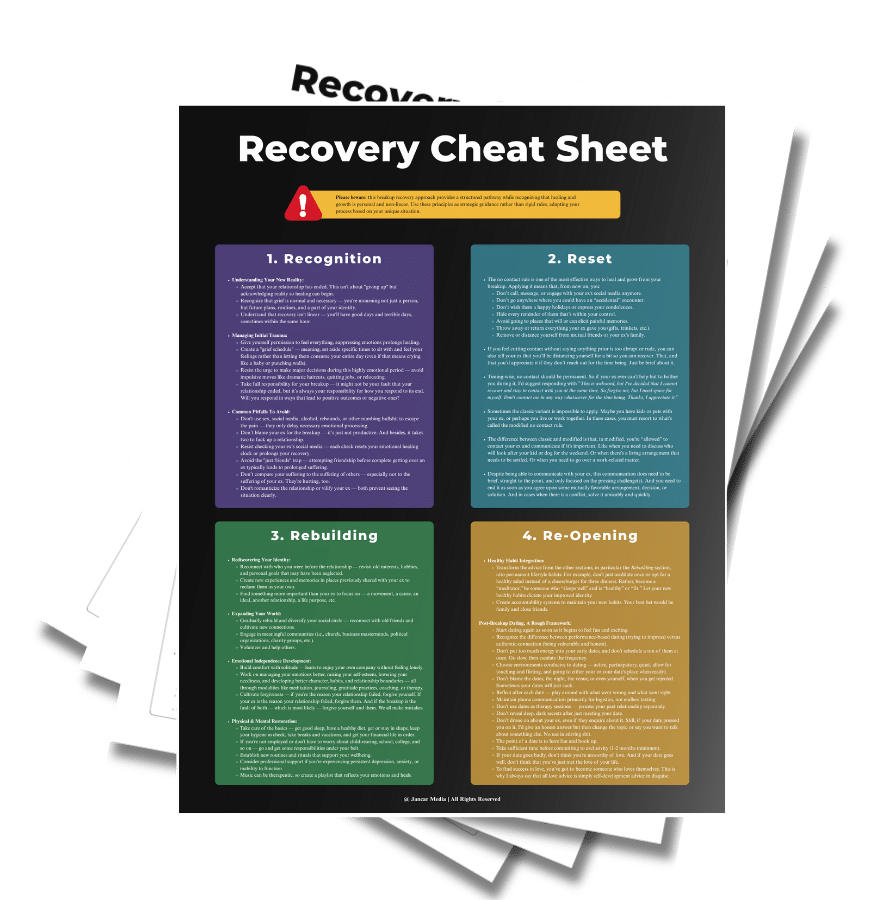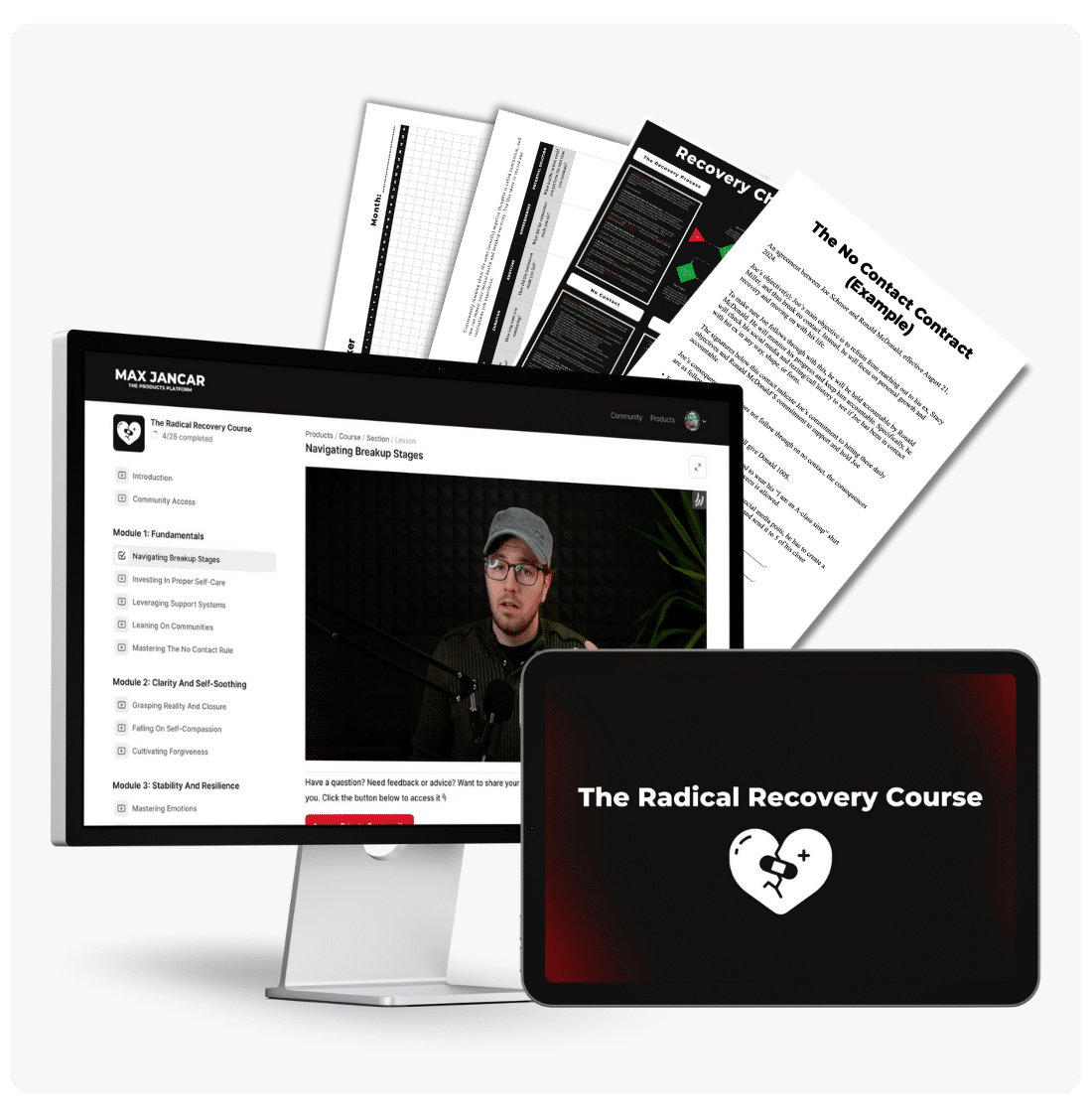Click play to listen to this article.
The world is abundant with breakup recovery methods, but I’ve seen no other work as efficiently and quickly as meditation, journaling, and therapy.
For most people, these three methods are the catalyst for stupendous personal growth. And because of their powerful healing capability, I’ve christened them as — you’ve guessed it! — The Holy Trinity Of Breakup Recovery.
Let’s go over each in turn.
A guide to breakup recovery based on embracing discomfort, extracting wisdom from dark moments, and healing through evidence-based practices.
Order Your CopyMeditation
Meditation is the act of observing oneself in silence and stillness. You can do it practically anywhere, at any time, and you don’t need any fancy gear or software to pull it off. Plus, the benefits of meditation are plentiful.
It improves focus, discipline, clear thinking, and your intuition’s accuracy. It motivates you to invest more in crucial life areas like sleep, health, social life, and spiritual well-being. And it increases emotional stability and deepens self-awareness, which translates to fewer tamper tantrums, frustration, and neuroticism. (1) (2) (3) (4)
Now that you’re all stirred up about meditation, here’s how to do it:
- Find a place where you won’t be disturbed. Set your timer, either a phone or a clock, for about 10 to 20 minutes.
- Sit down on the floor with your legs crossed. If it hurts, grab a pillow or two, and stick them right below you. Get ’em all nice and fluffy down there. Keep your back straight — tall as a mountain, the gurus say. And lastly, place your hands on your knees or cup them softly in your lap. As a side note, don’t stress too much about your posture being perfect. It doesn’t have to be. Just try your best.
- Close your eyes or look straight ahead and relax your whole body. The way you do this is by releasing any tension from each of your muscles. Start with the ones on your face and end with those on your feet. Fun fact: this process is called a body scan. It’s like foreplay before actual meditation.
- Take three deep breaths: in through the nose until your chest is full and out through your mouth until it fully contracts. After taking the deep breaths, shift to breathing at your usual pace.
- This is where the actual meditation starts. Keep inhaling through your nose and exhaling through your mouth for the next X minutes.
- Relax, unwind, and try to think about nothing. Remember: Meditation is all about focusing on your breath, despite the different thoughts and feelings that creep into your mind. It may even help to count “zero” when you reach the end of your inhale and “one” when you reach the end of your exhale. This way, you never lose track of your breath.
- Try to remember your name before you were born.
- Keep doing this over and over again until your timer rings.
Note that meditation will feel uncomfortable and challenging at first. You probably won’t be able to stay focused on your breath for more than three inhales/exhales. Chances are, your mind will wander off by them. That’s okay. In fact, it’s to be expected. You’re not accustomed to the painful sitting position yet, nor the weird sensations that come up, or the discipline of quieting the mind.
Don’t judge or beat yourself up. When you screw up, just let it go. You’ll get better in time. Now if you need extra help, what I found worked wonders are meditation apps. One of the best ones I’ve personally tried are Calm and Waking Up (I am not paid to recommend them).
This cheat sheet lays out 40+ solutions to overcoming a breakup so you can create a new opportunity for love — be that with your ex or someone completely different.
Get The Free Cheat SheetJournaling
Journaling has many benefits. It reduces emotional distress and the impact stress or stressful events have on us. It aids our sleep and sharpens our communication skills. It helps us become calmer, happier, and more productive. It even reduces the number of intrusive and obsessive thoughts we may be suffering from. (5) (6) (7)
Now the way you start journaling is simple. Grab a pen and paper and start writing about your breakup.
Maybe jot down the things you currently feel, like your worries, what you’re angry about, or what you’re afraid of. You can also write about what you’re grateful and appreciative for. Another solid idea is to put down the lessons from your last relationship. Or you can use journaling to outline an ideal future for yourself, for which you then set goals that will take you closer to actualizing it.
Hell, you can even write about all the above if you have enough time to kill.
Just whatever you do, don’t overanalyze the simple discipline. Too many people spend days researching the best times and places to journal and the pros and cons of different pens and notebooks. Don’t fall into that rabbit hole. Just start writing.
The therapeutic effects are sure to come regardless. The fact that you’ve brain-dumped your thoughts and feelings on a piece of paper makes feeling better afterwards virtually guaranteed.
Therapy
While many people bounce back and forth with the idea, the experience can be incredibly life-changing, and I can’t recommend it enough.
A good therapist will act as the examiner — the person asking, “Why?” They will lead you to question your inner world, consider new perspectives about your breakup, and help you realize new things about yourself and your dead relationship. They will also give you an outside and objective perspective on your situation.
The idea behind therapy is simple: making the unconscious aspects of a mind conscious. These are aspects like triggers for your emotional outbursts, niggling insecurities, and self-esteem issues. Now once you spawn adequate self-awareness around them, you’ll be able to exercise control over those blemishes. And that’s generally how you take care of your mental and emotional health.
Here, let me illustrate this for you.
Suppose you always felt uncontrollably anxious when your ex hasn’t called you back. In that case, there’s probably something hidden within your unconscious, causing you to react in such a senseless manner. By attending therapy, you can start burrowing into your past and examining your life problems, personal challenges, and traumas in detail to find the trigger for your anxiety.
Maybe you felt uncontrollably anxious because you had a neglectful father to whom you always tried to prove yourself. Maybe it was because you had a mother who only showed affection under certain conditions. Or maybe it’s a result of some other obscure trauma you’ve stumbled upon.
A therapist will help you figure these things out. And when that happens, you’ll be able to process your anxiety in a safe environment, which will further allow you to become more aware of that anxiety and, therefore, not feel so powerless to your outbursts when they occur. In time, you should be able to exercise enough emotional control to modify and change your behavior.
One last thing about therapy: don’t be too worried about picking the right type. I know there are many to choose from — REBT, CBT, ACT, existential, Gestalt, interpersonal, Jungian, psychoanalysis, etc. Still, studies show that all of them work to some extent and produce, on average, a relatively similar result. (8) (9)
So just pick one, try it out, and if it resonates, stick with it for the long haul. Because this is a long-term play. The only way to get results with therapy is to stick with it for months, sometimes even years.
Final Thoughts
An online course that teaches you how to heal and grow from a breakup so you can create a new possibility for love — with or without your ex.
Get Instant AccessZooming out, the reason these modalities work so well is because they help you make your unconscious thoughts, feelings, and traumas conscious. And as a result of this transition, you’re able to not only unearth them, but also face and acknowledge them.
From there on out, you’ll be much more competent in taking control of them as well. And once you take control, you’ll be able to actually manage these blemishes effectively so they don’t hinder your recovery anymore — or your overall mental health and personal growth.
This cheat sheet lays out 40+ solutions to overcoming a breakup so you can create a new opportunity for love — be that with your ex or someone completely different.
Get The Free Cheat SheetRelated Reading
- 8 Ways To Overcome Anger After A Breakup October 22, 2021
- Don’t Chase Happiness After A Breakup (Do This Instead) May 1, 2025
- I Dream About My Ex Every Night (Why And How To Stop) November 20, 2021
- The Backwards Law: How To Feel Better By Letting Go July 6, 2022
- How To Deal With Negative Emotional Triggers After A Breakup March 28, 2025
- 3 Surprising Reasons You Can’t Get Over Your Ex August 22, 2024



